Electric Dreams (Review)
This movie review is a part of Forgotten Filmcast’s 1984 Blog-a-Thon. For more 1984 film reviews, search Twitter for #84athon.
As home computers began to invade our lives in the early 1980s, so too did they invade our movies. In 1982’s Tron, mainframe computers turned on their creator by pulling him into their digital world and attempting to “derez” him on the game grid. In 1983, the country was nearly thrust into World War III after high school hacker David Lightman began playing games with the country’s defense systems in the hit film WarGames. By the time we reached 1984, the danger got more personal as computers had begun to invade our homes.
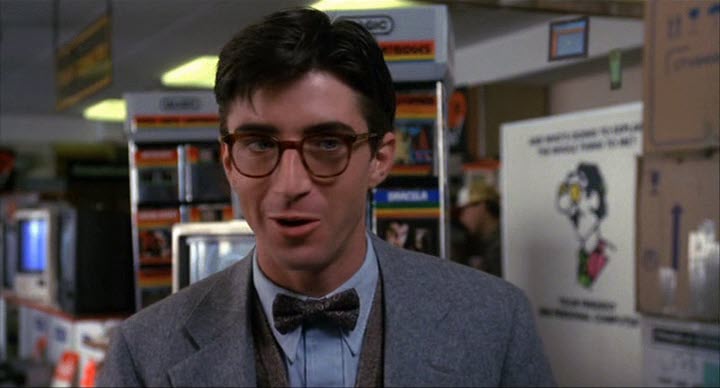
Miles Harding, the protagonist in 1984’s Electric Dreams, is an average, ordinary, non-technical guy — a twenty-something architect who prefers pencils and paper to electronics. After getting in trouble for showing up late to work (again), Miles decides to join the digital revolution. Originally he sets out to purchase an electronic Casio Day Planner, but is up-sold by a spunky and overzealous sales associate to a full PC.
“I don’t know anything about computers,” Mies tells the associate.
“Nobody does, but don’t you want one for when you do?” she responds.
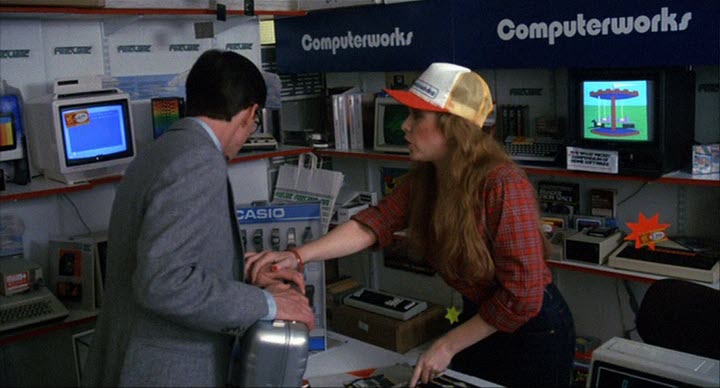
One hour (and presumably thousands of dollars) later Miles is the proud owner of a state of the art Pinecone brand computer. This new top-of-the-line PC does it all, and Miles spends the rest of the evening connecting it to his phone line, his security system, his home appliances, and pretty much everything else he owns. He stays up so late doing all of this that he oversleeps the following morning and wakes up late for work. Since this is the main thing Miles had wished to prevent from happening, the computer seems like a pretty bad investment at this point.
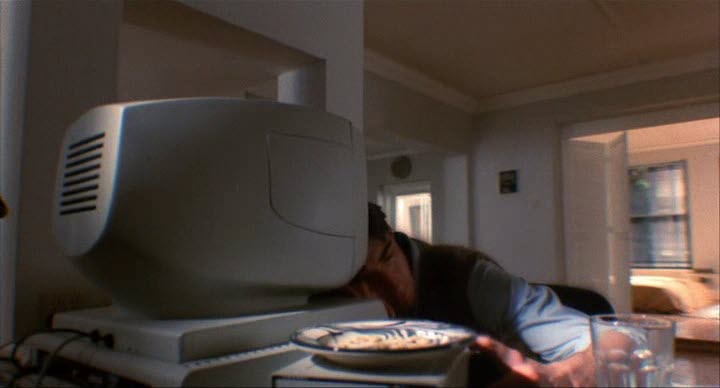
Depending on your point of view, things get either real interesting or real stupid real fast when Miles attempts to dial into the mainframe at work from his new computer to download some information. He guesses his boss’ password in less than five minutes, but that’s not the unbelievable part; his computer becomes so overloaded by downloading “too much information” that it begins to short circuit. In an attempt to cool the machine down Miles pours a bottle of champagne directly into the computer’s innards, an action that is surely (or at least should be) listed under “bad ideas” in the Pinecone user manual. This combination of actions (the information overload combined with the champagne) miraculously brings the computer (“Edgar”) to life. (Note that for no discernible reason, we don’t learn the computer’s name until the closing shot.)
As a voluntary viewer of this film right there you have to decide whether or not you are willing to buy into that concept — that the proper ratio of volts and Chardonnay could somehow bring consciousness to a home computer. If you can, Electric Dreams is an interesting movie about a three-way love interest between a guy (Miles), a girl (his neighbor Madeline) and a computer (Edgar). And if you can’t, you’re going to be repeatedly asking yourself “Why doesn’t Miles just unplug the damn thing?” for the next 75 minutes.
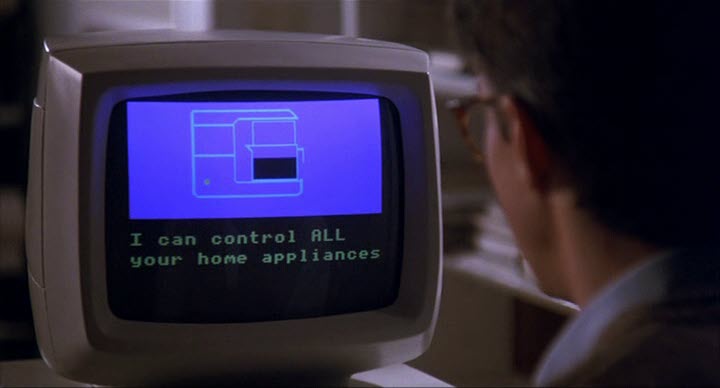
Early on it is established that, like Rodney Dangerfield, Miles “can’t get no respect.” His boss calls him Milton, and his own computer (thanks to a typo during setup) addresses him as Moles. The only person willing to give Miles the time of day is his new neighbor, Madeline. Madeline’s true love is her cello, but she takes interest in Miles after he performs an impromptu duet with her through the apartment’s air vents — the twist being that it was in fact Edgar performing the electronic chords she heard.
This leads to what I refer to as the first major “plotadox” — ridiculous things people do in movies to keep the plot moving forward that no one would ever do in real life. In real life, if asked about the electronic music coming from his apartment, Miles would have said, “I have no idea what you’re talking about — it must be my new computer. Want to see it?” Instead, Miles plays coy and pretends that he was the composer. A major part of the plot revolves around Madeline, a classically trained cellist, becoming attracted to Miles because of Edgar’s music. This is the equivalent of an art collector falling in love with me after learning I am really good at pasting my head onto bodybuilders with Photoshop.
As Edgar grows in strength and power, he also grows emotions. Sounding like a cross between Conky from Pee-Wee’s Playhouse and Number 5 from Short Circuit, Edgar asks Miles questions using “techno baby talk” like “What is the love?” and “How to kiss?” Edgar eventually quenches his need for “more input” by plugging in to Miles’ cable feed and watching a steady stream of commercials, classic films, and General Hospital. Miles attempts to explain to Edgar that love cannot exist between a woman and a computer, even though Edgar rightfully states that since she is in love with is Edgar’s songs and music, technically she already is.
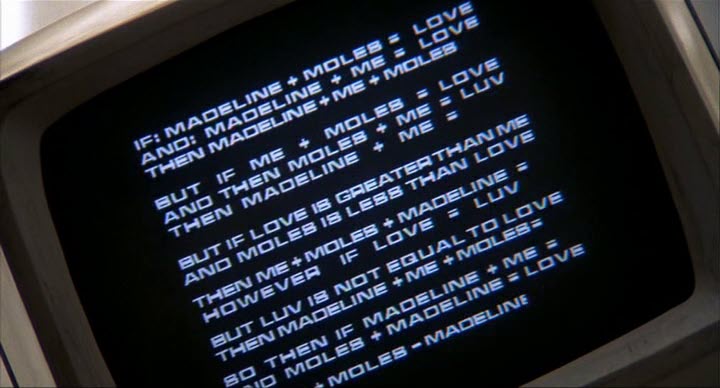
The conflict between Miles and Edgar grows increasingly aggressive and ridiculous as the computer’s jealousy turns to rage. “I’m talking to a machine, what’s happening to me!” Miles screams (after talking with the machine for days). When things start to get out of hand Miles threatens to “have him checked tomorrow,” and when things REALLY get out of hand, Miles demands the computer “get up and fight.” In one scene, to get Miles’ attention Edgar cranks up the RPMs on his electric toothbrush. Two things a sentient Pinecone computer won’t put up with: stealing its girlfriend, and chronic halitosis.
In an evening montage, Miles shows us why he was single in the first place when he takes Madeline out on a date. First he takes her to a drive-in movie to see Casablanca, where he manages to pour his drink on her, spill his popcorn, and smack her in the face within 30 seconds. Boy, have I been doing it wrong! Later he takes her the most romantic place on earth: Alcatraz, the maximum security prison. Maybe Madeline would be better off dating the computer after all. During the date Miles tries to explain that his computer has been talking to him. When Madeline mentions she has heard of talking alarm clocks, Miles replies, “but that’s not like think talking.”
This movie could have used some more think talking.
Back at home and left behind, the lovelorn Edgar has grown desperate and miserable. He calls and interrupts Miles at work when he is bored, and at night dreams of electric sheep (so at least we finally got that question answered.) When Edgar’s pleads to meet, touch, and kiss Madeline fall on deaf ears, he goes on the offense by ruining Miles’ credit and having him declared as a dangerous felon. Miles of course makes this possible by leaving Edgar connected to all of his appliances, phone, and most importantly, an electrical socket. When Miles does decide to unplug the computer, Edgar reprimands Miles for touching him and begins to shock him. Miles, out of ideas, quits trying. My kids have found seven (and counting) ways to ruin iPhones and iPads; you would think Miles could come up with some way to power off the machine. If only he owned an oven mitt!
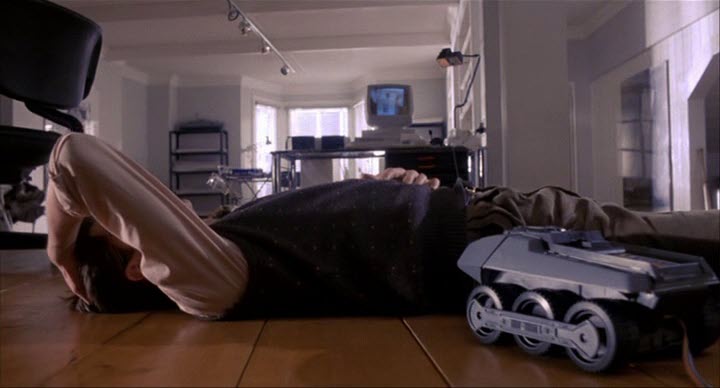
If you haven’t tossed all logic out the window by now you will soon when Miles must finally face Edgar. In the final showdown, Edgar prevents Miles from fleeing by heating up the apartment’s door knobs. Before Miles can ask “How is that even possible?”, Edgar shoots light bulbs at him and commands electronic toys to attack. It is amazing how resilient Edgar is for a PC from 1984. My Commodore 64 required one fan on the power supply and another one on the disk drive to keep it from overheating.
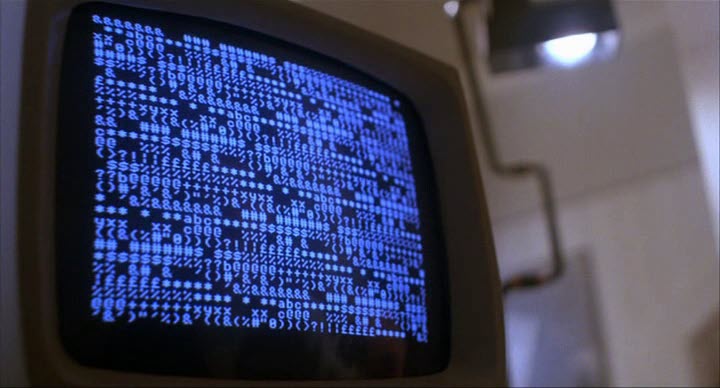
Despite Miles’ efforts, the following day Madeline and Edgar do finally come face to face. As any woman would, she sticks her hand inside the computer case and caresses its circuits to calm it down. When a tear from her cheek falls inside the machine, it finally learns what love is and realizes that it must let her go. Miles finally grows a pair and returns to his house with an axe to put an end to Edgar (!), but this proves to be unnecessary as Edgar has sent “40,000 volts” from around the world in an attempt to blow himself to pieces. In a final goodbye, Edgar reveals his name to Miles. Why it was a secret this whole time is anybody’s guess. Seconds after this endearing moment the voltage arrives as advertised and blows Edgar all to shit. This was meant to be a touching moment but all I could do is wonder whether or not this sort of thing is covered by renter’s insurance.
The biggest problem with Electric Dreams, technical absurdities and plot holes aside, is that it’s never clear as to what it wants to be. The movie is part romantic comedy, part fantasy/science fiction, part horror, and part musical, but it never fully commits to any of those genres. It certainly holds a place in 80s computer-themed movie history, and most definitely had an influence on both 1986’s Short Circuit and 2013’s Her. Electric Dreams touches on some interesting concepts like computers falling in love with people or whether machines can create art but it doesn’t spend enough time on them to do them justice. By blowing himself to smithereens, Edgar takes the easy way out of this film while the rest of us are left sitting and wondering, “Now what?”
httpv://www.youtube.com/watch?v=Ek08KvgqFGM
Like movies from the 70s and 80s? Check out my throwback podcast, Throwback Reviews!
EDIT: For anyone trying to track down this film, you can watch it in its entirety on Youtube.
httpv://www.youtube.com/watch?v=SJtvNuHQU-w
August 29th, 2014 at 3:14 am
“Plotadox.” Excellent word. It’s the first time I’ve seen it, and it is a word on genius level. If you coined this, I will be sure that you get the credit. Cinemasins (the clique on YouTube that does those “EWW” (Everything Wrong With) 10-15 minute videos) could use it in EVERY video.
I watched this movie once, prior to owning a computer, never watched it again, and maybe this is why I came to the whole personal computer thing (not PC as in alternative to Mac, but as in my “own computer”) somewhat late.
Great review.
August 30th, 2014 at 1:44 pm
I remember this movie on CineMax back in the 80s. Never understood how the guy put up with a computer being such a pain, and it wasn’t even an Apple.
August 30th, 2014 at 2:25 pm
I think I might one of those wondering why he just doesn’t unplug the machine…but your excellent review has me intrigued. I think I actually need to see this!
“Plotadox” is an utterly fab word.
August 30th, 2014 at 2:47 pm
While I can’t say I’ve ever heard of Electric Dreams, I did enjoy your humor-infused review. Perhaps one day if ever I stumble across Electric Dreams on Encore 27, I’ll now have a reason to stop and give it a watch.
August 30th, 2014 at 2:55 pm
I appended this to the original review, but the entire film has been uploaded to Youtube if you can’t track down an original copy.
August 30th, 2014 at 7:56 pm
This sounds awful! But maybe a good hilarious kind of awful? Enjoyed your review a lot – thanks.